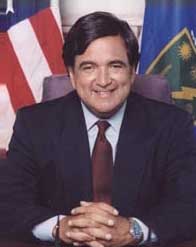
In recent days, various news media have exhorted us to attend to the re-enactment of the landing of the first English speaking colonists in North America, 400 years ago, at Jamestown, Virginia. I haven't been able to get properly excited.
Jamestown is part of a trio of historic attractions, along with Colonial Williamsburg and the Yorktown battlefield where the British surrendered to George Washington. I visited them nearly every year as a child. My mother, desperate to get a break from the Buffalo winter, loved to take me on a drive south in spring break. Williamsburg was the main dish, a Rockefeller-funded fantasyland portraying an antiseptic, harmonious colonial past. Yorktown I remember as cold and bleak -- come to think of it, I've never knowingly seen a battlefield that didn't feel bleak. Though Jamestown was the oldest and really "first," it was the undeveloped stepsister of the bigger twosome.
This 400th anniversary celebration is apparently intended to give Jamestown some luster -- and perhaps raise its importance as a tourist destination in relation to upstart Plymouth Rock. After all, those Puritans did not get to Massachusetts for another 13 years.
If we were to think about it, which we are not supposed to, we'd find this anniversary a thoroughly problematic occasion, much as many folks made the Columbus arrival anniversary in 1992. That occasion inspired parallel celebrations of 500 years of indigenous resistance across the hemisphere.
It is a simple fact that two of the "original sins" of the United States made their first appearance at the Jamestown colony:
- the occupation of native lands and extermination of their inhabitants began there;
- and it was at Jamestown that the first African chattel slaves were imported in 1619. Wonder if we are going to celebrate that anniversary?
the London Company’s Nov. 20, 1606 “Articles, Instructions, and Orders” did, indeed, demand that the prospective American colony “provide that the true word, and service of God and Christian faith be preached.” But the charter added that the “true word” must be “according to the doctrine, rights, and religion now professed and established within our realme of England.” In other words, Jamestown was to be a bastion of the Anglican Church, the established faith of England. The local government was to enforce religious conformity, not religious freedom.
According to Leo Pfeffer’s Church, State and Freedom, the leaders of the Virginia settlement wasted no time in carrying out that edict. Governor Thomas Dale in 1612 mandated “Lawes Divine, Moral and Martial” that decreed the death penalty for those who “speak impiously of the Trinity…or against the known articles of the Christian faith.”
Those who cursed would have a bodkin “thrust through the tongue,” and all immigrants to the new land were to report to the Anglican minister for “examination in the faith.” Those who refused facing a daily whipping “until he makes acknowledgement.” Joseph L. Conn
 The kind of fortune seekers who shipped out to the colony didn't put up for long with that autocratic governor. But the assumption that the state should dictate religious belief and practice was still a live issue in Virginia at the time of the U.S. revolution. The Virginian Founding Fathers, led by James Madison, knew exactly what they were trying to stamp out by putting separation of church and state in the Constitution.
The kind of fortune seekers who shipped out to the colony didn't put up for long with that autocratic governor. But the assumption that the state should dictate religious belief and practice was still a live issue in Virginia at the time of the U.S. revolution. The Virginian Founding Fathers, led by James Madison, knew exactly what they were trying to stamp out by putting separation of church and state in the Constitution.The Jamestown re-enactment brought out Pat Robertson and the dominionists who want us to know that this was founded as "Christian nation." Well maybe, but the original Anglican divines would have considered Robertson and Co. as bounders and heretics. Frederick Carlson dissects their agenda here.
Unhappily, the Episcopal Church got involved in the offical (not Robertson) Jamestown anniversary. That tidbit of Anglican history better fits the ethos of the old Episcopal Church of my childhood in which proper upper class WASPs got married and buried and otherwise devoted themselves to getting rich and running the country. Nowadays we have a women bishops and a queer bishop, and who knows how many other faithful oddities in our midst, although considerably less of the ruling class. I'm sorry that Episcopal News Service seemed to think this was our kind of pageant and that the Presiding Bishop lent her presence to the celebration. A church that has just gotten through commemorating Anglican William Wilberforce's leadership of the movement to abolish the slave trade might have thought a little more before throwing itself into the Jamestown commemoration.


































